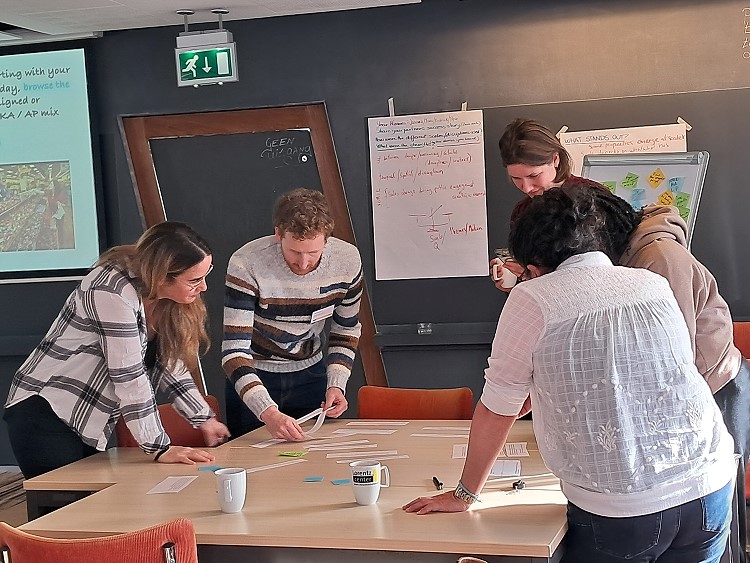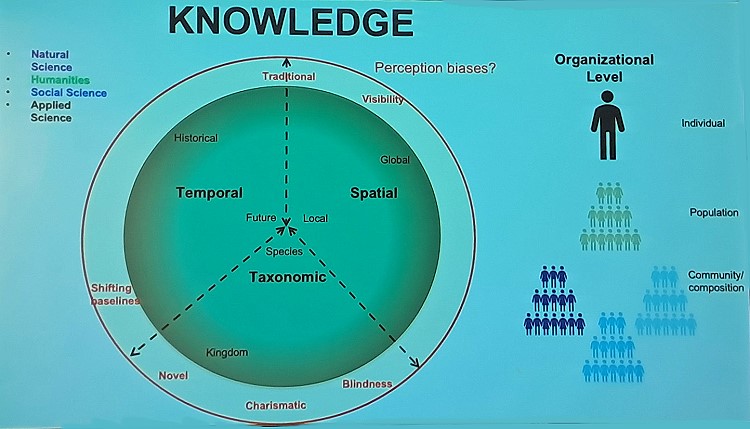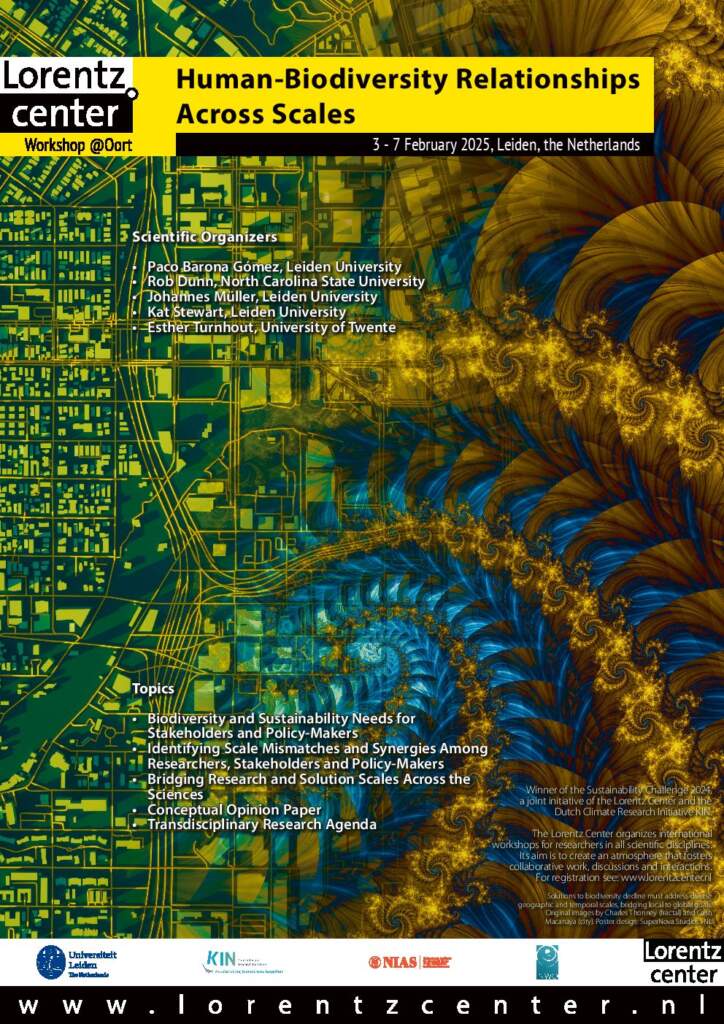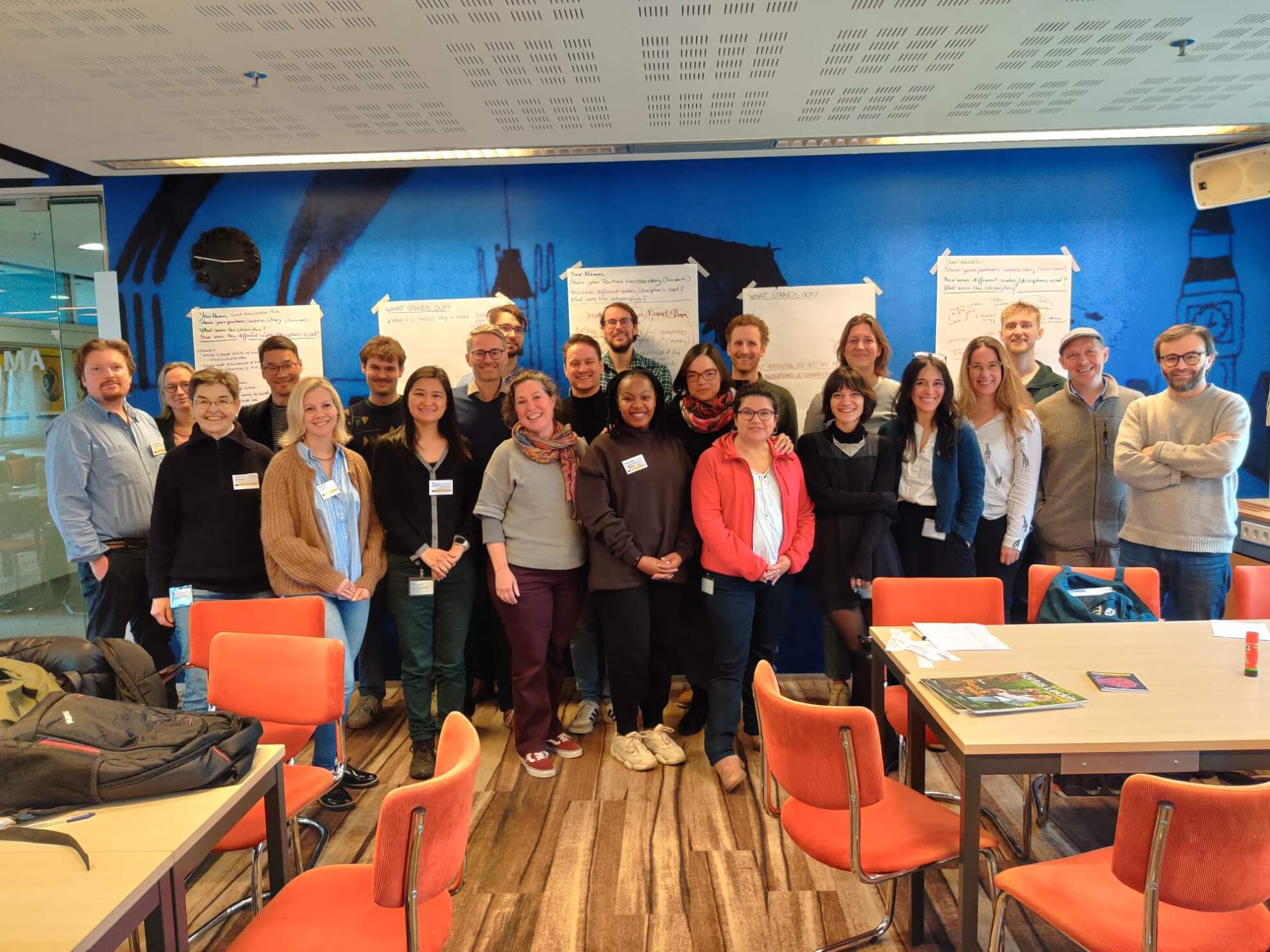This was the title of an exciting workshop convened from 3 to 7 February 2025 in the Lorentz Center in Leiden, The Netherlands, by a group of scholars from the social sciences, the humanities and natural sciences. The altogether 45 participants were scholars, researchers, and doers from different disciplines, societal sectors, continents, and generations to reflect and discuss about human-biodiversity relationships across different scales. They were seeking to understand the connection between different forms of knowledge and expertise and explore how to bring their different insights to bear from the often hidden, yet influential world of micro-organisms, to more eye-catching flora and emblematic animal species.

Gratefully, only few impulse talks were given in plenary, while most of the work happened in constantly changing configurations in groups in order to provide maximum opportunities for different perspectives to meet, confront, and seek out common understanding. The use of a range of art of hosting technologies with different group tasks and reporting back to the other participants made for a very dynamic workflow.
The explicit objective was to find enough common ground to produce an opinion piece for publication that could go a significant step towards creating a novel action space together by addressing identified blockages in different spheres. These could be at the science – policy / government interface or at the science – industry interface, among others. Addressing these blockages was important as the analysis of action plans and commitments were insufficient to bend the curve towards drastically reducing species loss and healing ecosystems. The potential role of finance was also discussed in this context.

Cornelia E Nauen of Mundus maris was one of the persons invited to bring a focus on potential action with an emphasis on safeguarding marine biodiversity and the small-scale fishers in many parts of the globe, who depend directly on healthy ecosystems sustained by rich biodiversity. Naturally, it could not go unnoticed that by now 1270 marine fishes and invertebrates were red listed by IUCN, while 10 years ago it was only 550 species. Many more could not be assessed fully because they are considered data-deficient.
In this context, it is highly worrying that despite valiant efforts of civil society organisations and researchers to speak out in support of small-scale fishers and their typically selective and low impact gears, and despite celebrating the first 10 years of the Voluntary Guidelines to Ensure Sustainable Small-Scale Fisheries in the context of food security and poverty eradication (SSF Guidelines) artisanal fishers, men and women, are rarely listened to when major decisions are being taken that affect biodiversity resources and their livelihoods. The SSF Guidelines were adopted after extensive consultation in 2014 by the FAO’s Committee of Fisheries of government representatives. Yet, despite convening e.g. the SSF Summit in 2024 in the FAO premises, the COFI agenda had barely any space for the around 120 million people deriving a living from artisanal fishing and connected value chains. That needs to change.
It’s not going to be easy as research shows that the power concentration of what may be called ‘keystone companies’ in international seafood extraction, salmon aquaculture, feeds and trade is critical in shaping the future direction of seafood production and, as a consequence, the future of marine ecosystems (1). The power of what is now labelled as the Ocean 100 companies is such that they appropriate fully 60% of the revenues in the broader ocean economy, and the biggest 10 with their subsidiaries are dominant in eight sectors thereof (2).
This provides more than enough food for thought of where the transdisciplinary collaboration discussed could help to make a different for life on the planet. It should emphasise common action spaces, bringing together the wide range of knowledges, skills, competencies and organisational effort needed.
Grateful for the insights, discussions, and opportunities to learn from each other – and looking forward to advancing on the joint analysis and emerging initiatives taking shape.
Grateful for the insights, discussions, and opportunities to learn from each other – and looking forward to advancing on the joint analysis and emerging initiatives taking shape.
(1) Österblom H, Jouffray J-B, Folke C, Crona B, Troell M, Merrie A, et al. (2015) Transnational Corporations as ‘Keystone Actors’ in Marine Ecosystems. PLoS ONE 10(5): e0127533. doi:10.1371/journal.pone.0127533
(2) Virdin J, Vegh T, Jouffray J-B, Blasiak R, Mason S, Österblom H, et al., (2021) The Ocean 100: Transnational corporations in the ocean economy. Sci. Adv. 7: eabc804. doi:10.1126

handwerklichen Fischerei Akademie
- Human – Biodiversity Relationships Across Scales
- World Fisheries Day, 21 November 2024, celebrated in Nigeria
- Mundus maris participated in the 2024 World Fisheries Day organized by Canoe and Fishing Gear Association of Ghana (CaFGOAG).
- Beitrag von Mundus maris zur öffentlichen Anhörung zu UNOC3
- Gipfeltreffen zur Kleinfischerei in Rom, 5.-7. Juli 2024
- Regionales Symposium zur europäischen Kleinfischerei, Larnaca, Zypern, 1.-3. Juli 2024
- Baltic Fisheries Emergency Meeting, Brussels, 26 June 2024
- Ambivalent role of Market and Technology in the Transitions from Vulnerability to Viability: Nexus in Senegal SSF
- Shell fisheries as stewardship for mangroves
- Afrikanische Ausgabe des 4WSFC in Kapstadt, 21. bis 23. November 2022
- World Fisheries Day, 21 November 2023
- Webinar: Herausforderungen und Chancen der Fischerei in Nigeria
- Präsentation der FishBase-App auf dem Symposium in Tervuren
- MARE Conference on Blue Fear – Mundus maris reflects
- The Transition From Vulnerability to Viability Through Illuminating Hidden Harvests, 26 May 2023
- EGU-Veranstaltungen zum Thema Geoethik und gemeinsames Lernen
- Solidarität mit den handwerklichen Fischern in Senegal und Mauretanien
- The legal instruments for the development of sustainable small-scale fisheries governance in Nigeria, 31 March 2023
- Tools for Gender Analysis: Understanding Vulnerability and Empowerment, 17 February 2023
- Community resilience: A framework for non-traditional field research, 27 January 2023
- Sustainability at scale – V2V November webinar
- Europäische Ausgabe des 4WSFC in Malta, 12. bis 14. September 2022
- Beitrag von Mundus maris zum SSF-Gipfel in Rom
- Women fish traders in Yoff and Hann, Senegal, victims or shapers of their destiny?
- Die Akademie setzt ihre Arbeit in Yoff fort
- Illuminating the Hidden Harvest – a snapshot
- Virtual launch event FAO: International Year of Artisanal Fisheries and Aquaculture
- The Small-Scale Fisheries Academy as a source of operational support to PA Guidelines
- Welt-Fischereikongress, Adelaide, 20.-24. September
- Mundus maris unterstützt den Kampf von Paolo, dem Fischer, in der Toskana, Italien
- Catching-up – SSF Academy Yoff, 27 Febr. 2021
- Ausbau der Fähigkeiten der Akteure für eine nachhaltige handwerkliche Fischerei
- Testen von Trainingsmethoden während der Pilotphase der Akademie der handwerklichen Fischerei im Senegal
- Eine Premiere – Einweihung der Akademie der handwerklichen Fischerei in Senegal

